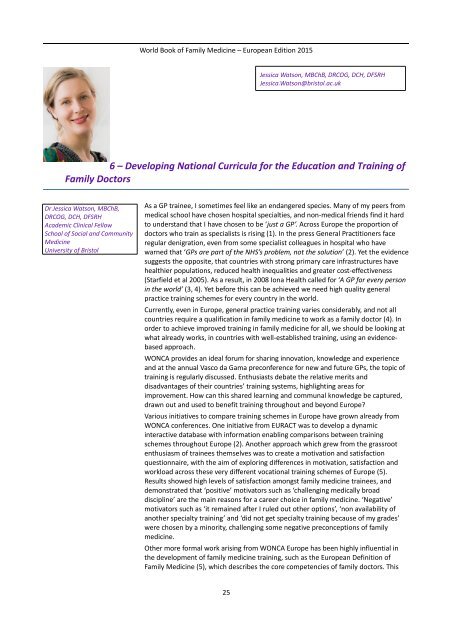Family Medicine
World Book 2015
World Book 2015
Create successful ePaper yourself
Turn your PDF publications into a flip-book with our unique Google optimized e-Paper software.
World Book of <strong>Family</strong> <strong>Medicine</strong> – European Edition 2015<br />
Jessica Watson, MBChB, DRCOG, DCH, DFSRH<br />
Jessica.Watson@bristol.ac.uk<br />
6 – Developing National Curricula for the Education and Training of<br />
<strong>Family</strong> Doctors<br />
Dr Jessica Watson, MBChB,<br />
DRCOG, DCH, DFSRH<br />
Academic Clinical Fellow<br />
School of Social and Community<br />
<strong>Medicine</strong><br />
University of Bristol<br />
As a GP trainee, I sometimes feel like an endangered species. Many of my peers from<br />
medical school have chosen hospital specialties, and non-medical friends find it hard<br />
to understand that I have chosen to be ‘just a GP’. Across Europe the proportion of<br />
doctors who train as specialists is rising (1). In the press General Practitioners face<br />
regular denigration, even from some specialist colleagues in hospital who have<br />
warned that ‘GPs are part of the NHS’s problem, not the solution’ (2). Yet the evidence<br />
suggests the opposite, that countries with strong primary care infrastructures have<br />
healthier populations, reduced health inequalities and greater cost-effectiveness<br />
(Starfield et al 2005). As a result, in 2008 Iona Health called for ‘A GP for every person<br />
in the world’ (3, 4). Yet before this can be achieved we need high quality general<br />
practice training schemes for every country in the world.<br />
Currently, even in Europe, general practice training varies considerably, and not all<br />
countries require a qualification in family medicine to work as a family doctor (4). In<br />
order to achieve improved training in family medicine for all, we should be looking at<br />
what already works, in countries with well-established training, using an evidencebased<br />
approach.<br />
WONCA provides an ideal forum for sharing innovation, knowledge and experience<br />
and at the annual Vasco da Gama preconference for new and future GPs, the topic of<br />
training is regularly discussed. Enthusiasts debate the relative merits and<br />
disadvantages of their countries’ training systems, highlighting areas for<br />
improvement. How can this shared learning and communal knowledge be captured,<br />
drawn out and used to benefit training throughout and beyond Europe?<br />
Various initiatives to compare training schemes in Europe have grown already from<br />
WONCA conferences. One initiative from EURACT was to develop a dynamic<br />
interactive database with information enabling comparisons between training<br />
schemes throughout Europe (2). Another approach which grew from the grassroot<br />
enthusiasm of trainees themselves was to create a motivation and satisfaction<br />
questionnaire, with the aim of exploring differences in motivation, satisfaction and<br />
workload across these very different vocational training schemes of Europe (5).<br />
Results showed high levels of satisfaction amongst family medicine trainees, and<br />
demonstrated that ‘positive’ motivators such as ‘challenging medically broad<br />
discipline’ are the main reasons for a career choice in family medicine. ‘Negative’<br />
motivators such as ‘it remained after I ruled out other options’, ‘non availability of<br />
another specialty training’ and ‘did not get specialty training because of my grades’<br />
were chosen by a minority, challenging some negative preconceptions of family<br />
medicine.<br />
Other more formal work arising from WONCA Europe has been highly influential in<br />
the development of family medicine training, such as the European Definition of<br />
<strong>Family</strong> <strong>Medicine</strong> (5), which describes the core competencies of family doctors. This<br />
25


